初中英语8大时态精析,附易错题
初中八种英语时态精讲精练(含答案)
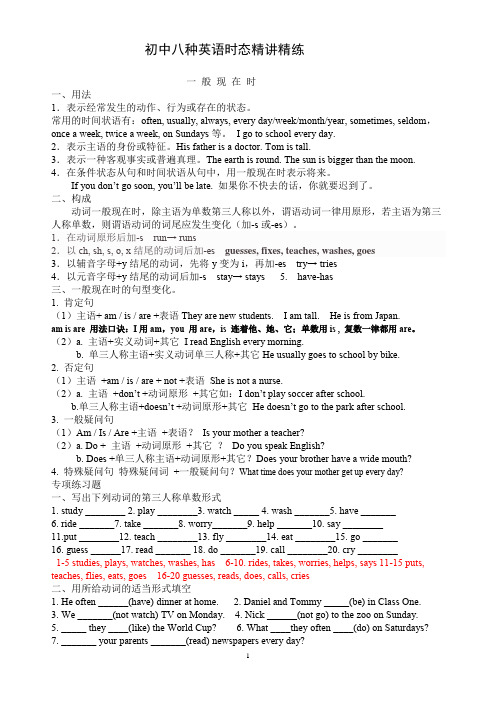
初中八种英语时态精讲精练一般现在时一、用法1.表示经常发生的动作、行为或存在的状态。
常用的时间状语有:often, usually, always, every day/week/month/year, sometimes, seldom,once a week, twice a week, on Sundays等。
I go to school every day.2.表示主语的身份或特征。
His father is a doctor. Tom is tall.3.表示一种客观事实或普遍真理。
The earth is round. The sun is bigger than the moon. 4.在条件状态从句和时间状语从句中,用一般现在时表示将来。
If you don’t go soon, you’ll be late. 如果你不快去的话,你就要迟到了。
二、构成动词一般现在时,除主语为单数第三人称以外,谓语动词一律用原形,若主语为第三人称单数,则谓语动词的词尾应发生变化(加-s或-es)。
1.在动词原形后加-s run→ runs2.以ch, sh, s, o, x结尾的动词后加-es guesses, fixes, teaches, washes, goes3.以辅音字母+y结尾的动词,先将y变为i,再加-es try→ tries4.以元音字母+y结尾的动词后加-s stay→ stays 5. have-has三、一般现在时的句型变化。
1. 肯定句(1)主语+ am / is / are +表语They are new students. I am tall. He is from Japan.am is are 用法口诀:I用am,you 用are,is 连着他、她、它;单数用is , 复数一律都用are。
(2)a. 主语+实义动词+其它I read English every morning.b. 单三人称主语+实义动词单三人称+其它He usually goes to school by bike.2. 否定句(1)主语+am / is / are + not +表语She is not a nurse.(2)a. 主语+don’t +动词原形+其它如:I don’t pla y soccer after school.b.单三人称主语+doesn’t +动词原形+其它He doesn’t go to the park after school.3. 一般疑问句(1)Am / Is / Are +主语+表语?Is your mother a teacher?(2)a. Do + 主语+动词原形+其它?Do you speak English?b. Does +单三人称主语+动词原形+其它?Does your brother have a wide mouth?4. 特殊疑问句特殊疑问词+一般疑问句?What time does your mother get up every day?专项练习题一、写出下列动词的第三人称单数形式1. study ________2. play ________3. watch _____4. wash _______5. have _______6. ride _______7. take _______8. worry_______9. help _______10. say ________11.put ________12. teach ________13. fly ________14. eat ________15. go _______16. guess ______17. read _______ 18. do _______19. call ________20. cry ________1-5 studies, plays, watches, washes, has 6-10. rides, takes, worries, helps, says 11-15 puts, teaches, flies, eats, goes 16-20 guesses, reads, does, calls, cries二、用所给动词的适当形式填空1. He often ______(have) dinner at home.2. Daniel and Tommy _____(be) in Class One.3. We _______(not watch) TV on Monday.4. Nick ______(not go) to the zoo on Sunday.5. _____ they ____(like) the World Cup?6. What ____they often ____(do) on Saturdays?7. _______ your parents _______(read) newspapers every day?8. The girl _______(teach) us English on Sundays.9. She and I ________(take) a walk together every evening.10. The moon ________ (travel) round the earth.11. It usually ________ (take) me more than two hours to finish my homework.12. I will tell him the good news as soon as he ________ (come) back.13. Miss Gao is very busy. She ________ (sleep) six hours a day.14. Look! Susan ________ (dance) in the garden. She often ________ (dance) there.15. The children will go to the Summer Palace if it ________ (not rain) tomorrow.16. I _________ any pears (not have). But Mary _________ some (have).17. What language ____ you _____? (speak) 18. My brother _____ to be a scientist. (not like) 19. We ______ Japanese at school. (not study) 20. He _____ playing football. (not like)1. has2. are3. don’t have4. doesn’t go5. Do like6. do, do7. Do, read8. teaches9. take 10. travels 11. takes 12. comes 13. sleeps 14. is dancing, dances 15. doesn’t rain 16. don’t have, has 17. do, speak 18. doesn’t like 19. don’t study 20. doesn’t like三、按照要求改写句子1. Daniel watches TV every evening.(改为否定句)_________________________2. I do my homework every day.(改为一般疑问句,并作肯、否定回答)________________________________________________________3. Amy likes playing computer games.(改为一般疑问句,并作肯、否定回答)___________________________________________________4. We go to school every morning.(改为否定句)____________________________5. Sun Yang usually washes some clothes on Saturday.否定句: _____________ 一般疑问句: ________________ 划线提问: ____________6. Tom does his homework at home.否定句: ______________ 一般疑问句: ____________ 划线提问_____________1. Daniel doesn’t watch TV every evening.2. Do you do your homework every day? Yes, I do. No, I don’t.3. Does Amy like playing computer games? Yes, she does. No, she doesn’t.4. We don’t go to school every morning.5. Sun Yang doesn’t usually wash any clothes on Saturday. Does Sun Yang usually wash any clothes on Saturday? What does Sun Yang usually do on Saturday?6. Tom doesn’t do his homework at home. Does Tom do his homework at home? Where does Tom do his homework?四、选用所给的词语适当形式填空give, rain, enjoy, sing, return, borrow, keep1. It often ______ in my hometown in summer.2. Sometimes the birds _______ in the tree.3. Joe usually ____ books from the school library, but she never _____ them on time.4. May I ________ the dictionary for a week?5. The little boy ________ himself in the garden on Saturdays.6. Mary is a good girl. She often ________ me a hand when I need some help.1. rains2. sing3. borrows, returns4. keep5. enjoys6. gives一般过去时的用法一、定义:表示过去某一时间所发生的动作或存在的状态;表示在过去一段时间内,经常性或习惯性的动作。
初中英语八大时态-详细语法解析-习题及答案

过去将来时1。
宾语从句或间接引语中eg He didn’t expect that we would all be there.2。
表示过去习惯性的动作eg During that period,he would do this every day.3.表示过去的愿望、倾向,多用于否定句eg They knew that we would never permit such a thing。
过去将来时基本结构过去将来时由would, was/were going to, was/were to was/were about to等加动词原形构成, 也可由was/were on the point of加动名词构成。
例句:I knew you would agree. 我知道你会同意的。
I said I would arrange everything. 我说我来安排一切。
八种时态详解:过去将来时表示过去的某时以后将要发生的动作。
但这个”将来”时间绝不会延伸到“现在”;而仅限于“过去时间区域内"。
由此可以看出,含这个时态的句子常带一个表示“过去某个时间点”的状语.这个状语或是一个短语,或是一个句子。
这个时态常用于:A)宾语从句或间接引语中;B)表示过去习惯性的动作;C)表示过去情况中的“愿望”、“倾向”,多用于否定句。
例如:A) When I thought about it , I wondered what their reaction would be . 当我考虑这件事时,我想知道他们的反应是什么。
She told me that she would go on trip to Europe the next day. 她告诉我,她第二天要去欧洲旅行。
He didn’t expect that we would all be there. 他没料到我们会全在那儿。
B) During that period , he would do morning-exercises every day. 在那段时间,他每天早锻炼。
初中英语八大时态讲解及练习(全)

一、一般现在时:概念:经常、反复发生的动作或行为及现在的某种状况。
时间状语:always, usually, often, sometimes, every week (day, year, month…), once a week, on Sundays, etc.基本结构:①be动词;②行为动词否定形式:①am/is/are+not;②此时态的谓语动词若为行为动词,则在其前加don't,如主语为第三人称单数,则用doesn't,同时还原行为动词。
一般疑问句:①把be动词放于句首;②用助动词do提问,如主语为第三人称单数,则用does,同时,还原行为动词。
|在一般现在时中,当主语是第三人称单数时,谓语动词要用第三人称单数形式,即常在动词原形后加-s或-es。
一、人称代词he, she, it是第三人称单数。
如:He likes watching TV. 他喜欢看电视。
She has lunch at twelve. 她十二点吃午餐。
It looks like a cat. 它看起来像只猫。
(口诀:I用am,you用are,is用于她他它,单数名词用is,复数名词都用are)二、单个人名、地名或称呼作主语;是第三人称单数。
如:①Han Mei looks like her mother. 韩梅看起来像她的母亲。
②Beijing is in China. 北京在中国。
③Uncle Wang often makes cakes. 王叔叔经常做蛋糕。
三、单数可数名词或"this / that / the+单数可数名词"作主语时,是第三人称单数。
如:①A horse is a useful animal. 马是有用的动物。
②This book is yours. 这本书是你的。
四、不定代词someone, somebody, nobody, everything, something等及指示代词this, that作主语时,是第三人称单数。
初中英语语法-八种时态详解与练习
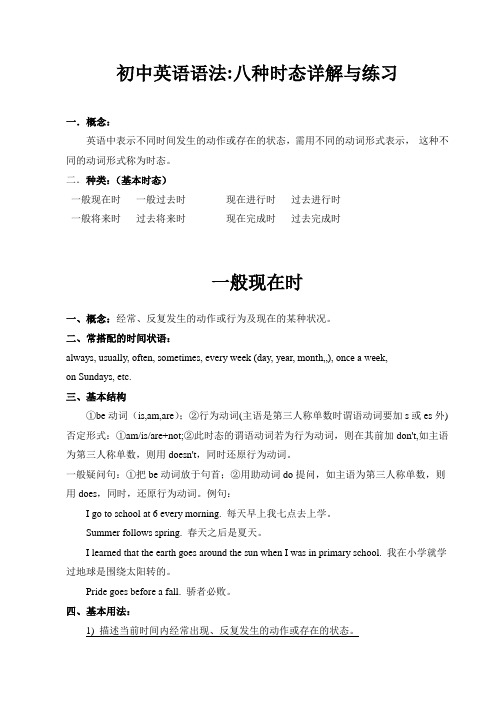
初中英语语法:八种时态详解与练习一.概念:英语中表示不同时间发生的动作或存在的状态,需用不同的动词形式表示,这种不同的动词形式称为时态。
二.种类:(基本时态)一般现在时一般过去时现在进行时过去进行时一般将来时过去将来时现在完成时过去完成时一般现在时一、概念:经常、反复发生的动作或行为及现在的某种状况。
二、常搭配的时间状语:always, usually, often, sometimes, every week (day, year, month…), once a week,on Sundays, etc.三、基本结构①be动词(is,am,are);②行为动词(主语是第三人称单数时谓语动词要加s或es外) 否定形式:①am/is/are+not;②此时态的谓语动词若为行为动词,则在其前加don't,如主语为第三人称单数,则用doesn't,同时还原行为动词。
一般疑问句:①把be动词放于句首;②用助动词do提问,如主语为第三人称单数,则用does,同时,还原行为动词。
例句:I go to school at 6 every morning. 每天早上我七点去上学。
Summer follows spring. 春天之后是夏天。
I learned that the earth goes around the sun when I was in primary school. 我在小学就学过地球是围绕太阳转的。
Pride goes before a fall. 骄者必败。
四、基本用法:1) 描述当前时间内经常出现、反复发生的动作或存在的状态。
在这种情景中,句子常带有表示频率的时间状语:always , everyday , often , once a week (month , year , etc.) , sometimes , seldom , usually等等,以表示句中的动作或状态是习惯性的、经常性的。
八年级英语时态易错辨析练习题20题含答案解析
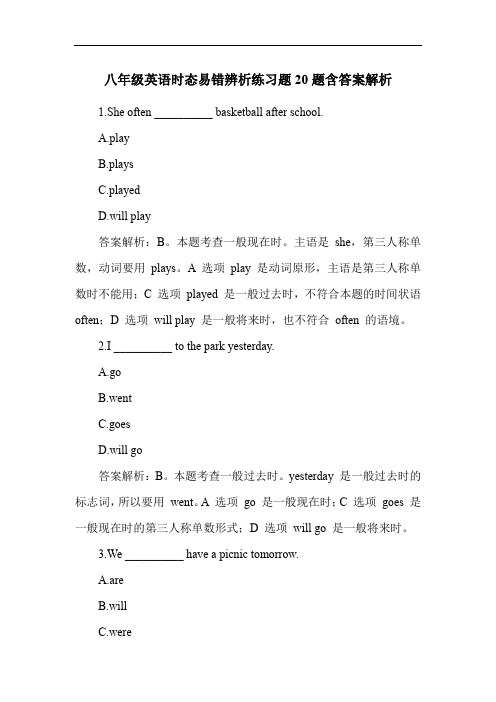
八年级英语时态易错辨析练习题20题含答案解析1.She often __________ basketball after school.A.playB.playsC.playedD.will play答案解析:B。
本题考查一般现在时。
主语是she,第三人称单数,动词要用plays。
A 选项play 是动词原形,主语是第三人称单数时不能用;C 选项played 是一般过去时,不符合本题的时间状语often;D 选项will play 是一般将来时,也不符合often 的语境。
2.I __________ to the park yesterday.A.goB.wentC.goesD.will go答案解析:B。
本题考查一般过去时。
yesterday 是一般过去时的标志词,所以要用went。
A 选项go 是一般现在时;C 选项goes 是一般现在时的第三人称单数形式;D 选项will go 是一般将来时。
3.We __________ have a picnic tomorrow.A.areB.willC.wereD.have答案解析:B。
本题考查一般将来时。
tomorrow 是一般将来时的标志词,will+动词原形表示将来。
A 选项are 不能直接接动词原形;C 选项were 是过去式;D 选项have 不是表示将来的形式。
4.My mother __________ cooking when I got home.A.doesB.is doingC.was doingD.will do答案解析:C。
本题考查过去进行时。
when I got home 是过去的时间点,在这个时间点妈妈正在做饭,所以用was doing。
A 选项does 是一般现在时;B 选项is doing 是现在进行时;D 选项will do 是一般将来时。
5.He __________ hard every day.A.studyB.studiesC.studiedD.will study答案解析:B。
初中英语的八种时态及易错题解答
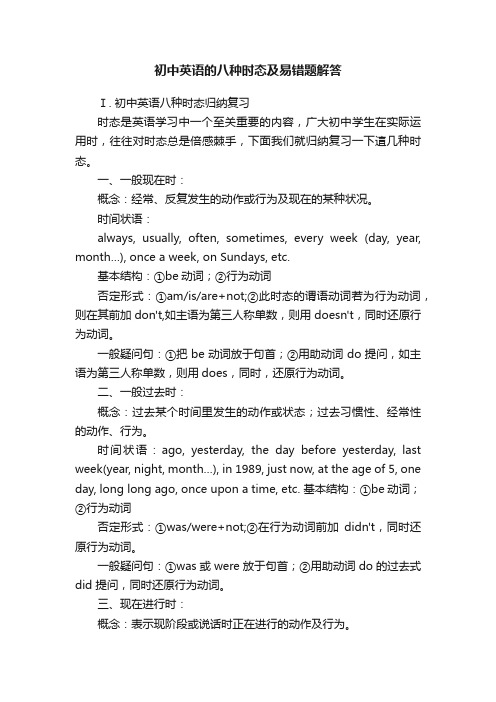
初中英语的八种时态及易错题解答Ⅰ. 初中英语八种时态归纳复习时态是英语学习中一个至关重要的内容,广大初中学生在实际运用时,往往对时态总是倍感棘手,下面我们就归纳复习一下這几种时态。
一、一般现在时:概念:经常、反复发生的动作或行为及现在的某种状况。
时间状语:always, usually, often, sometimes, every week (day, year, month…), once a week, on Sundays, etc.基本结构:①be动词;②行为动词否定形式:①am/is/are+not;②此时态的谓语动词若为行为动词,则在其前加don't,如主语为第三人称单数,则用doesn't,同时还原行为动词。
一般疑问句:①把be动词放于句首;②用助动词do提问,如主语为第三人称单数,则用does,同时,还原行为动词。
二、一般过去时:概念:过去某个时间里发生的动作或状态;过去习惯性、经常性的动作、行为。
时间状语:ago, yesterday, the day before yesterday, last week(year, night, month…), in 1989, just now, at the age of 5, one day, long long ago, once upon a time, etc. 基本结构:①be动词;②行为动词否定形式:①was/were+not;②在行为动词前加didn't,同时还原行为动词。
一般疑问句:①was或were放于句首;②用助动词do的过去式did 提问,同时还原行为动词。
三、现在进行时:概念:表示现阶段或说话时正在进行的动作及行为。
时间状语:now, at this time, these days, etc.基本结构:am/is/are+doing否定形式:am/is/are+not+doing.一般疑问句:把be动词放于句首。
初中英语语法八大时态总结及练习题
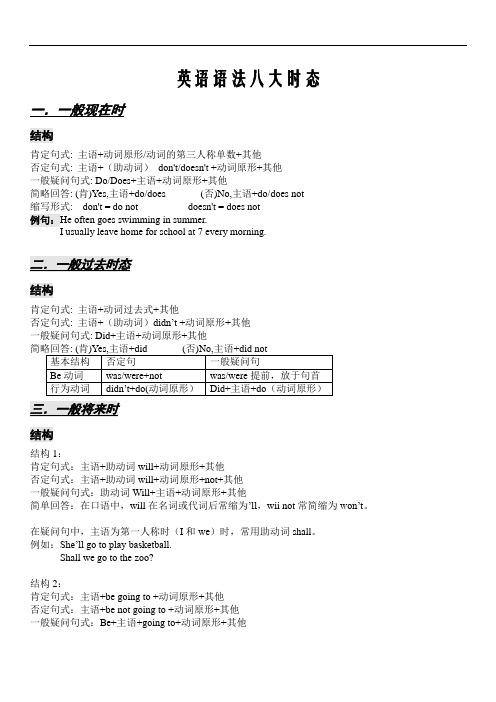
英语语法八大时态一.一般现在时结构肯定句式: 主语+动词原形/动词的第三人称单数+其他否定句式: 主语+(助动词)don't/doesn't +动词原形+其他一般疑问句式: Do/Does+主语+动词原形+其他简略回答: (肯)Yes,主语+do/does (否)No,主语+do/does not缩写形式: don't = do not doesn't = does not例句:He often goes swimming in summer.I usually leave home for school at 7 every morning.二.一般过去时态结构肯定句式: 主语+动词过去式+其他否定句式: 主语+(助动词)didn’t +动词原形+其他一般疑问句式: Did+主语+动词原形+其他基本结构否定句一般疑问句Be动词was/were+not was/were提前,放于句首行为动词didn’t+do(动词原形)Did+主语+do(动词原形)三.一般将来时结构结构1:肯定句式:主语+助动词will+动词原形+其他否定句式:主语+助动词will+动词原形+not+其他一般疑问句式:助动词Will+主语+动词原形+其他简单回答:在口语中,will在名词或代词后常缩为’ll,wii not常简缩为won’t。
在疑问句中,主语为第一人称时(I和we)时,常用助动词shall。
例如:She’ll go to play basketball.Shall we go to the zoo?结构2:肯定句式:主语+be going to +动词原形+其他否定句式:主语+be not going to +动词原形+其他一般疑问句式:Be+主语+going to+动词原形+其他简略回答:(肯)Yes,主语+be (否)No,主语+be not将来时其他表示法1)be going to表示将来表示说话人的打算、计划、安排或根据迹象判断必然或很可能发生的事情。
初中英语八大时态讲解及练习(全)
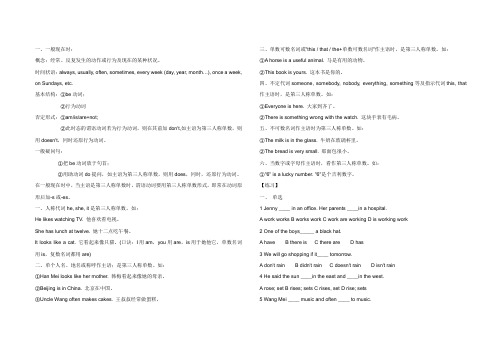
一、一般现在时:概念:经常、反复发生的动作或行为及现在的某种状况。
时间状语:always, usually, often, sometimes, every week (day, year, month…), once a week, on Sundays, etc.基本结构:①be动词;②行为动词否定形式:①am/is/are+not;②此时态的谓语动词若为行为动词,则在其前加don't,如主语为第三人称单数,则用doesn't,同时还原行为动词。
一般疑问句:①把be动词放于句首;②用助动词do提问,如主语为第三人称单数,则用does,同时,还原行为动词。
在一般现在时中,当主语是第三人称单数时,谓语动词要用第三人称单数形式,即常在动词原形后加-s或-es。
一、人称代词he, she, it是第三人称单数。
如:He likes watching TV. 他喜欢看电视。
She has lunch at twelve. 她十二点吃午餐。
It looks like a cat. 它看起来像只猫。
(口诀:I用am,you用are,is用于她他它,单数名词用is,复数名词都用are)二、单个人名、地名或称呼作主语;是第三人称单数。
如:①Han Mei looks like her mother. 韩梅看起来像她的母亲。
②Beijing is in China. 北京在中国。
③Uncle Wang often makes cakes. 王叔叔经常做蛋糕。
三、单数可数名词或"this / that / the+单数可数名词"作主语时,是第三人称单数。
如:①A horse is a useful animal. 马是有用的动物。
②This book is yours. 这本书是你的。
四、不定代词someone, somebody, nobody, everything, something等及指示代词this, that 作主语时,是第三人称单数。
初中英语八种时态详解及练习
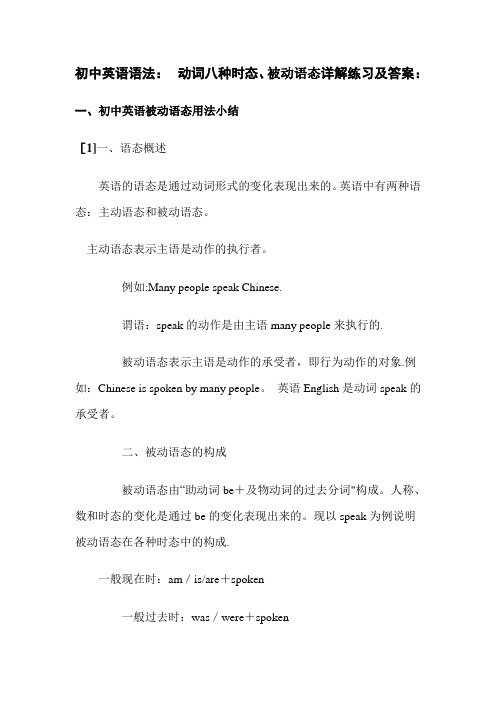
初中英语语法:动词八种时态、被动语态详解练习及答案:一、初中英语被动语态用法小结[1]一、语态概述英语的语态是通过动词形式的变化表现出来的。
英语中有两种语态:主动语态和被动语态。
主动语态表示主语是动作的执行者。
例如:Many people speak Chinese.谓语:speak的动作是由主语many people来执行的.被动语态表示主语是动作的承受者,即行为动作的对象.例如:Chinese is spoken by many people。
英语English是动词speak的承受者。
二、被动语态的构成被动语态由“助动词be+及物动词的过去分词"构成。
人称、数和时态的变化是通过be的变化表现出来的。
现以speak为例说明被动语态在各种时态中的构成.一般现在时:am/is/are+spoken一般过去时:was/were+spoken一般将来时:will/shall be+spoken现在进行时:am/is/are being+spoken过去进行时:was/were being+spoken现在完成时:have/has been+spoken过去完成时:had been + spoken三、被动语态的用法(1)不知道或没有必要说明动作的执行者是谁。
例如:Some new computers were stolen last night.一些新电脑在昨晚被盗了.(不知道电脑是谁偷的)This bridge was founded in 1981。
这座桥竣工于1981年。
(2)强调动作的承受者,而不强调动作的执行者。
例如:The glass was broken by Mike.玻璃杯是迈克打破的。
This book was written by him.这本书是他写的.Your homework must be finished on time.你们的家庭作业必须及时完成。
四、主动语态变被动语态的方法(1)把主动语态的宾语变为被动语态的主语。
初中英语八大时态讲解及练习(全)

初中英语八大时态讲解及练习(全)概念:经常、反复发生的动作或行为及现在的某种状况。
时间状语:always, usually, often, sometimes, every week (day, year, month…), once a week, on Sundays, etc.基本结构:①be动词;②行为动词否定形式:①am/is/are+not;②此时态的谓语动词若为行为动词,则在其前加don't,如主语为第三人称单数,则用doesn't,同时还原行为动词。
一般疑问句:①把be动词放于句首;②用助动词do提问,如主语为第三人称单数,则用does,同时,还原行为动词。
在一般现在时中,当主语是第三人称单数时,谓语动词要用第三人称单数形式,即常在动词原形后加-s或-es。
一、人称代词he, she, it是第三人称单数。
如:He likes watching TV. 他喜欢看电视。
She has lunch at twelve. 她十二点吃午餐。
It looks like a cat. 它看起来像只猫。
(口诀:I用am,you用are,is用于她他它,单数名词用is,复数名词都用are)二、单个人名、地名或称呼作主语;是第三人称单数。
如:①Han Mei looks like her mother. 韩梅看起来像她的母亲。
②Beijing is in China. 北京在中国。
③Uncle Wang often makes cakes. 王叔叔经常做蛋糕。
三、单数可数名词或"this / that / the+单数可数名词"作主语时,是第三人称单数。
如:①A horse is a useful animal. 马是有用的动物。
②This book is yours. 这本书是你的。
四、不定代词someone, somebody, nobody, everything, something等及指示代词this, that 作主语时,是第三人称单数。
初中八种英语时态精讲精练(含答案)

初中八种英语时态精讲精练(含答案)初中八种英语时态精讲精练现在时态一、用法1.表示频繁的行动、行为或存在状态。
常用的时间状语有:often,usually,always,everyday/week/month/year,sometimes,seldom,onceaweek,twiceaweek,onsundays等。
igotoschooleveryday.2.表示主语的身份或特征。
hisfatherisadoctor.tomistall.3.表达客观事实或普遍真理。
地球是圆的。
太阳比月亮大。
4.在条件状态从句和时间状语从句中,使用一般现在时来表示将来。
ifyoudon’tgosoon,you’llbelate.如果你不快去的话,你就要迟到了。
二、构成在现在时,除了单数第三人称主语外,谓语动词总是使用原形。
如果主语是单数第三人称,谓语动词的结尾应该改变(加-s或-es)。
1.添加-srun→ 跟随动词的原始形式2.以ch,sh,s,o,x结尾的动词后加-esguesses,fixes,teaches,washes,goes3.以辅音字母+y结尾的动词,先将y变为i,再加-estry→tries4.以元音字母+y结尾的动词后加-sstay→stays5.have-has三、一般现在时的句型变化。
1.肯定句(1)主语+主语+谓语他们都是高个子学生。
他来自日本。
Amisare用法公式:我用是,你用是,是连接他、她和它;用法表示单数,复数。
(2) A.主语+实词动词+其他动词b.单三人称主语+实义动词单三人称+其它heusuallygoestoschoolbybike.2.否定句(1)主语+AM/is/are+not+谓语sheisnotanurse(2)a.主语+don’t+动词原形+其它如:idon’tplaysoccerafterschool.b、一个三人主语+不+动词原型+其他他放学后不去公园。
一般问题(1)am/is/are+主语+表语?isyourmotherateacher?(2)a.do+主语+动词原形+其它?doyouspeakenglish?b、是否+单一三人主语+动词原型+其他人?你的兄弟会说话吗?4.特殊疑问句特殊疑问词+一般疑问句?你妈妈每天都做什么?特殊练习一、写出下列动词的第三人称单数形式1.学习2。
初中英语8大时态精析,附易错题

初中英语8大时态精析,附易错题01一般现在时的用法1) 表示经常性或习惯性的动作,常与表示频度的时间状语连用。
例:every…, sometimes,ofen,always,usually, twice a week, at…, on Sunday等。
I leave home for school at 7 every morning.He watches Tv once a week .2) 表示普遍真理,客观存在,科学事实。
The earth moves around the sun.Shanghai lies in the east ofChina.3) 格言或警句。
Pride goes before a fall. 骄者必败。
注意:此用法如果出现在宾语从句中,即使主句是过去时,从句谓语也要用一般现在时。
例:Columbus proved that the earth is round..4) 表示现在时刻的状态、能力、个性或爱好。
I don't want so much.Ann Wang writes good English but does not speak well.比较:Now I put the sugar in the cup.I am doing my homework now.第一句用一般现在时,用于操作演示或指导说明的示范性动作,表示言行的瞬间动作。
再如:Now watch me, I switch on the current and stand back.第二句中的now是进行时的标志,表示正在进行的动作的客观状况,所以后句用一般现在时。
02一般过去时的用法1)在确定的过去时间里所发生的动作或存在的状态。
时间状语有:yesterday, an hour ago, the other day, in 1982,yesterday morning (afternoon, vening…),last night (week, month, year…), a moment ago , a week ago, three years ago…just now,等。
八年级英语时态易错辨析练习题20题(带答案)

八年级英语时态易错辨析练习题20题(带答案)1. My sister ______ (like/likes/is liking) reading books very much. She reads every day.答案:likes解析:一般现在时表示经常或习惯性的动作。
主语my sister是第三人称单数,动词要用第三人称单数形式,like的第三人称单数形式是likes。
is liking是现在进行时的结构,但这里表达的是一种爱好,不是正在进行的动作,所以不能用is liking。
2. Look! The boys ______ (play/are playing/plays) football on the playground.答案:are playing解析:由look可知,这是一个正在发生的动作,要用现在进行时,其结构为be动词(am/is/are)+动词的现在分词形式。
主语the boys是复数,be动词用are,play的现在分词是playing,所以答案是are playing。
play是一般现在时,plays是一般现在时第三人称单数形式,都不符合这个语境。
3. We ______ (go/will go/are going) to the park this Sunday.答案:will go解析:this Sunday表示将来的时间,句子表达的是计划好的将来动作。
will go表示一般将来时,单纯地表示将来要做某事。
go是一般现在时,不符合语境。
are going虽然也可以表示将来,但通常表示按照计划即将发生且马上就要发生的动作,这里用will go更合适。
4. He ______ (write/writes/is writing) a letter to his pen pal every month.答案:writes解析:every month表明这是一个经常发生的动作,要用一般现在时。
最新初中英语八大时态-详细语法解析-习题及答案

过去将来时1.宾语从句或间接引语中eg He didn't expect that we would all be there.2.表示过去习惯性的动作eg During that period, he would do this every day.3.表示过去的愿望、倾向,多用于否定句eg They knew that we would never permit such a thing.过去将来时基本结构过去将来时由would, was/were going to, was/were to was/were about to等加动词原形构成, 也可由was/were on the point of加动名词构成。
例句:I knew you would agree. 我知道你会同意的。
I said I would arrange everything. 我说我来安排一切。
八种时态详解:过去将来时表示过去的某时以后将要发生的动作。
但这个"将来"时间绝不会延伸到“现在”;而仅限于“过去时间区域内”。
由此可以看出,含这个时态的句子常带一个表示“过去某个时间点”的状语。
这个状语或是一个短语,或是一个句子。
这个时态常用于:A)宾语从句或间接引语中;B)表示过去习惯性的动作;C)表示过去情况中的“愿望”、“倾向”,多用于否定句。
例如:A) When I thought about it , I wondered what their reaction would be . 当我考虑这件事时,我想知道他们的反应是什么。
She told me that she would go on trip to Europe the next day. 她告诉我,她第二天要去欧洲旅行。
He didn't expect that we would all be there. 他没料到我们会全在那儿。
八年级英语时态易错辨析练习题20题含答案解析

八年级英语时态易错辨析练习题20题含答案解析1. I often ______ my homework after dinner.A.doB.doesC.didD.will do答案解析:A。
本题考查一般现在时。
主语是I,非第三人称单数,动词用原形do。
B 选项does 用于主语是第三人称单数时;C 选项did 是一般过去时;D 选项will do 是一般将来时,不符合题意。
2. She ______ to school by bike yesterday.A.goesB.wentC.goD.will go答案解析:B。
本题考查一般过去时。
yesterday 是一般过去时的标志词,动词要用过去式went。
A 选项goes 是一般现在时第三人称单数形式;C 选项go 是原形;D 选项will go 是一般将来时。
3. We ______ have a picnic tomorrow if it's fine.A.areB.willC.wereD.would答案解析:B。
本题考查一般将来时。
if 引导的条件状语从句,主句用一般将来时,从句用一般现在时。
will+动词原形表示将来。
A 选项are 后面不能直接跟动词原形have;C 选项were 是过去式;D 选项would 通常用于虚拟语气或过去将来时。
4. My brother usually ______ football on Sundays.A.playB.playsC.playedD.will play答案解析:B。
本题考查一般现在时。
usually 是一般现在时的标志词,主语my brother 是第三人称单数,动词用plays。
A 选项play 是原形;C 选项played 是一般过去时;D 选项will play 是一般将来时。
5. They ______ to the park last weekend.A.goB.wentC.goesD.will go答案解析:B。
- 1、下载文档前请自行甄别文档内容的完整性,平台不提供额外的编辑、内容补充、找答案等附加服务。
- 2、"仅部分预览"的文档,不可在线预览部分如存在完整性等问题,可反馈申请退款(可完整预览的文档不适用该条件!)。
- 3、如文档侵犯您的权益,请联系客服反馈,我们会尽快为您处理(人工客服工作时间:9:00-18:30)。
初中英语8大时态精析,附易错题01一般现在时的用法1) 表示经常性或习惯性的动作,常与表示频度的时间状语连用。
例:every…, sometimes,ofen,always,usually, twice a week, at…, on Sunday等。
I leave home for school at 7 every morning.He watches Tv once a week .2) 表示普遍真理,客观存在,科学事实。
The earth moves around the sun.Shanghai lies in the east ofChina.3) 格言或警句。
Pride goes before a fall. 骄者必败。
注意:此用法如果出现在宾语从句中,即使主句是过去时,从句谓语也要用一般现在时。
例:Columbus proved that the earth is round..4) 表示现在时刻的状态、能力、个性或爱好。
I don't want so much.Ann Wang writes good English but does not speak well.比较:Now I put the sugar in the cup.I am doing my homework now.第一句用一般现在时,用于操作演示或指导说明的示范性动作,表示言行的瞬间动作。
再如:Now watch me, I switch on the current and stand back.第二句中的now是进行时的标志,表示正在进行的动作的客观状况,所以后句用一般现在时。
02一般过去时的用法1)在确定的过去时间里所发生的动作或存在的状态。
时间状语有:yesterday, an hour ago, the other day, in 1982,yesterday morning (afternoon, vening…),last night (week, month, year…), a moment ago , a week ago, three years ago…just now,等。
Where did you go just now?2)表示在过去一段时间内,经常性或习惯性的动作。
When I was a child, I often played football in the street.Whenever the Browns went during their visit, they were given a warm welcome.3)句型:It is time for sb. to do sth "到……时间了" "该……了"It is time sb. did sth. "时间已迟了" "早该……了"It is time for you to go to bed. 你该睡觉了。
It is time you went to bed.你早该睡觉了。
4) wish, wonder, think, hope 等用过去时,作试探性的询问、请求、建议等。
I thought you might have some. 我以为你想要一些。
注意:一般过去时表示的动作或状态都已成为过去,现已不复存在。
Christine was an invalid all her life.(含义:她已不在人间。
)Mrs. Darby lived in Kentucky for seven years.(含义:达比太太已不再住在肯塔基州。
)1)表示现在( 指说话人说话时) 正在发生的事情。
We are waiting for you.2)表示长期的或重复性的动作,说话时动作未必正在进行。
Mr. Green is writing another novel. (说话时并未在写,只处于写作的状态。
) She is learning piano under Mr. Smith.3)瞬时动词的进行时一定表示将来的含义。
瞬时动词:come,go,arrive,leave,finish,end,start,begin等。
We are arriving at London.持续动词的进行时需要加表示将来的时间状语或有将来的语境时才能表将来。
I am travelling next month.4)与always, constantly, forever 等词连用,表示反复发生的动作或持续存在的状态,往往带有说话人的主观色彩。
You are always changing your mind.03现在进行时1)表示现在( 指说话人说话时) 正在发生的事情。
We are waiting for you.2)表示长期的或重复性的动作,说话时动作未必正在进行。
Mr. Green is writing another novel. (说话时并未在写,只处于写作的状态。
)She is learning piano under Mr. Smith.3)瞬时动词的进行时一定表示将来的含义。
瞬时动词:come,go,arrive,leave,finish,end,start,begin等。
We are arriving at London.持续动词的进行时需要加表示将来的时间状语或有将来的语境时才能表将来。
I am travelling next month.4)与always, constantly, forever 等词连用,表示反复发生的动作或持续存在的状态,往往带有说话人的主观色彩。
You are always changing your mind.04过去进行时1)过去进行时主要表示过去某个时刻正在进行的动作,常和表示过去的状语连用。
例如:(just)then 那时,当时;at this/that time 在这/那时yesterday afternoon昨天下午;at nine 在九点;last night 昨晚;(at)this time yesterday在昨天这个时候但在不少情况下,没有表示时间的状语,这时需要通过上下文来表示。
What were you doing at nine last night?昨晚九点的时候,你在做什么?I was watching TV at home yesterday afternoon.我昨天下午正在家里看电视。
They were playing football at this time yesterday.昨天这个时候他们在踢足球。
2)过去进行时也可以表示过去某一段时间内正在进行的动作。
常与those days, the whole morning, from 8:00 to 12:00 last night等时间状语连用。
From 1983 to 1998 , he was teaching at Yale .从1983到1998年,他正在耶鲁大学教书。
They were building a bridge last winter .去年冬天他们正在造一座桥。
3)过去进行时表示过去将要发生的动作。
现在进行时可以表示将来的动作,同样,过去进行时也可以表示从过去某时看来将要发生的动作,常用在间接引语中。
Lucy arrived in Beijing last Friday. But she was leaving for Hong Kong the next morning.上周五Lucy到达北京,但第二天早晨就要动身去香港了。
She asked him if he was coming back for lunch.她问他午饭是否准备回来吃。
4)过去进行时与频度副词always forever,continually,constantly等连用时表示过去经常反复的动作,常常带有埋怨、讨厌、赞扬或喜爱等情绪。
My sister was always forgetting things.(表示埋怨)He was always helping others. (表示赞扬)05一般将来时1)表示将来某个时间要发生的动作或存在的状态,也表示将来经常或重复发生的动作。
时间状语:tomorrow , soon , next Monday , next year , next weekend , this afternoon , this evening ……2)will do表示主观意愿做某事。
I will see a movie this morning.表示客观的不以人的意志为转移的客观将来。
Fish will die without water.表示临时决定。
——Mom, where is the newspaper?——Wait a moment. I will get it for you.3) be going to +do表示计划,安排要发生的事。
The play is going to be produced next month。
表示有迹象要发生的事Look at the dark clouds.There is going to be a storm.06过去将来时立足于过去某一时刻,从过去看将来,常用于宾语从句中。
时间状语:the next day(morning, year…),the following month(week…),etc. He said he would go to Beijing theI didn't know if she was going to come。
Wang Lei said that she was going to visit her uncle next Saterday。
07现在完成时1)表示过去发生或已经完成的某一动作对现在造成的影响或结果。
标志词:already, yet, just, ever, never, beforeI have finished my homework.我做完家庭作业了。
(过去某时开始做,到现在已完成。
)2)表示:过去已经开始,持续到现在的动作或状态,并且有可能继续下去。
标志词:for, since, since…agoI have studied English for six years.我已经学了六年英语了。
(六年前开始学英语,一直学到现在, 也可能继续学也可能就此不学了。
)3)have/has gone to 、have/has been to 和have/has been in的区别have/ has gone to 去了,在去某地的路上或在某地,人还未回来have/ has been to 曾经去过,人已经回来了have/ has been in 已经在,常与一段时间连用如:He has been to Shenyang before.他以前曾去过沈阳。
